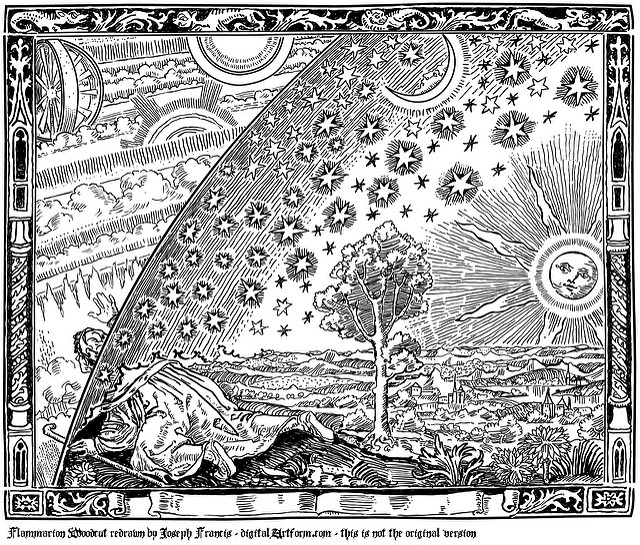
DUCKMARX via Compfight
This might read heavy because I’m confronting some pervasive concepts. It’s like I’m playing the heavy, but try to read it in a gracious spirit because it is meant to bring clarity not conflict. Plus, I have a damp sense of humor [not too wet and not super dry either] so take that into account. Chill and stuff.
Okay, buckle in for the bit of Groundwork:
First, from my end, I make no secret here that I see things from the paradigm of a Christian worldview. This has been my family background, my life experience, and the central feature in my graduate education. That’s my lens.
In having a lens I’m not alone. In fact, every one sees reality through his or her own lens, but not everyone will really investigate and coordinate their worldview in a consistent way. I won’t either, not because I’m not making an effort, but because seeing the task to completion is so massive and unwieldy. As I approach this topic I come with a vatanage point…and so do you.
We can take as a given:
Our beliefs will cloud our perceptions and our perceptions will work to evidence our already held beliefs–except in rare cases where we make a focused and conscious effort to consider or accept another point of view. Those cases are quite rare because we tend to use our life experiences to back up what we already think is true. (I’m reiterating.) So, when a change happens–it can be big. This is essentially how the Christian idea of “conversion” plays out too: A person is thinking one thing about reality, and somehow becomes convinced of something else and has a turnaround to something new. Christians would also say God had a direct part in igniting that process.
Peeking outside the Bubble:
In learning more about the people outside the Christian belief “bubble,” I’ve noticed that plenty of my assumptions about non Christians were flawed, false, or incomplete. Other times, I’ve noticed that while some of these perceptions may ring true at first blush, they more often reflect a universal truth about what it means to be human, (and do not effectively describe the group that doesn’t ascribe to the Christian belief system.)
The 10 misconceptions are things that many Christians want to be true. If they are not it could convince them that Christianity doesn’t provide the best answers. This fear can cause people to be even more unreasonable or averse to mystery…even though Christianity is chocked full of mystery. I’ve come to a place where I am more settled with mystery.
Christianity provides a framework for me, and everyone has a framework whether they know it or not and whether they like it or not. Christianity takes many shapes in different eras and in different cultures. Since I came from a conservative fundamentalist background I first saw the world through that lens. I haven’t retained all those same beliefs. Now the beliefs I ascribe to are not as important as the person I am becoming. Jesus as God-man is plausible and that is fine for me. For others, that simply will not be enough. For non Christians it will be too narrow for their spirituality. I also realize that Christians may sometimes perpetuate myths for an imperious framework needed to maintain fervency.
Better that we see these misconceptions for what they are than run afoul with them and forget whose image is the object of our recreation. (That would be Jesus, through the power of the Holy Spirit, if you aren’t following me.) I give you these misconceptions to expand your ideas about the Christian framework and how it can help more than hurt.
Now to the 10 Misconceptions:
1. Non believers aren’t spiritual, or at best they are pseudo spiritual.
This is false because the amount of mystery and the unknown in life as we perceive it (being finite in mind and body) all point to the spiritual (the unseen). What is pseudo spiritual to some is more likely to be something that smacks as out of sync with one’s prescribed Christian beliefs. We are all spiritual and what we try to understand outside of we what is know is be definition spiritual, whether is a referred at that or not. The interest in spiritual things has been vibrant throughout human history as long as we have been trying to understanding our world. The “brand” (if you will) of spiritual that is may be may be off-putting depending on your experience, training, or preferences. Ex: “Using Tarot cards is pseudo spiritual.” Actually, using them is an attempt to understand the spiritual, but for Christians it falls outside the scope of what is acceptable because of the tenants residing in the Bible.
2. Non believers aren’t happy because they don’t know Jesus.
This is a complex and interesting misconception because it assumes that Christians are happy, by contrast. Many are not. Many are miserable and their Christian belief system has not given them this happiness. Christians may behave as if they are discontent or unhappy also. Certainly some Christians are content and at peace for periods of time, and some are remarkably hopeful and peaceful is even the most horrible circumstances. Nevertheless this is also true of non Christians.
3. Non believers do good things to “get them to heaven”, or to otherwise alleviate their sin-guilt.
What is more often the case is that people (Christian and non) try to do good things because they feel they should. Their motivations are quite varied and prove to be shallow or to be deep. Christians, though they may feel their eternal destiny is secure, will do good things sometimes for reasons just as poorly conceived as non believers. Strangely, it can boil down, in the final count, to semantics. It’s false to guess the true motivations of why people do good. Better to do Good for the love of it and accept the good at face value as it can only be originally sourced in the Source of goodness–apart from whom no goodness dwells. The idea that actual goodness cannot come from non Christians contradicts the Christian precept that a good God has created all of us and that same God works through all of creation, (and even those who do not knowledge “him”.)
4. Non believers can’t have peace with God.
For Christians, peace with God usually looks like a publicly confessed accession to the belief that Jesus is the Savior who died for the sins of humankind (i.e. somehow understanding atonement). But, in general, peace with God is probably as varied as there are people in the world. Grace is sufficient and comes in a manner of ways that point to the ultimate work of Grace that is of and from God. If by peace we are really speaking of contentment, and not atonement, then many do arrive at peace with God at some point in their lives. Many also arrive at a place of grace and forgiveness as it is God’s prerogative how this happens. The very idea of grace necessitates that a mental ascension is not the crux of the matter at all. Sometimes it is not at all involved as any modicum of studying a Christian theology of (mental) disability will reveal. Grace does not require anything on the part of the recipient accept perhaps a sort of acceptance. What that does or doesn’t have to be has be a rueful point over the years but is actually quite simple and easy if we are to believe in its true nature.
5. Non believers have misperceptions about reality and their place in the world.
Our finite minds give each person the opportunity to routinely misperceive reality, regardless of her beliefs in Jesus or God. No one has the corner on this problem. We share our foolishness in this regard across the whole spectrum of humankind. To think otherwise is to underscore the misperception.
Since this post is getting too long, the next 5 misconceptions will be revealed in the next post-here.
Thanks for reading!
Pass this along, will you?
Do you agree? I’d like to hear your thoughts.





